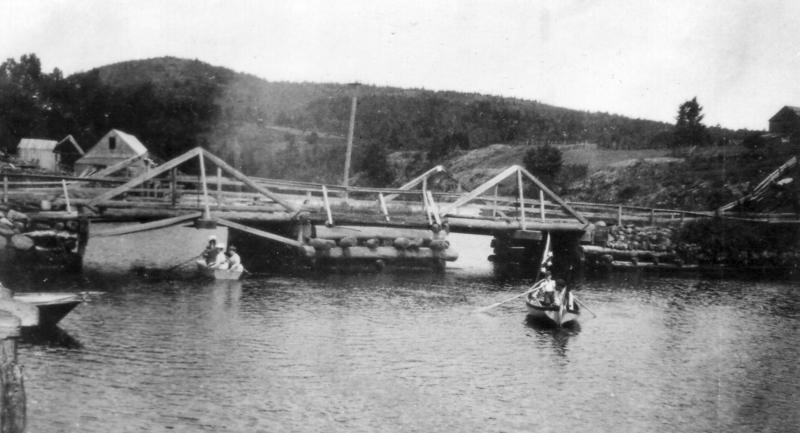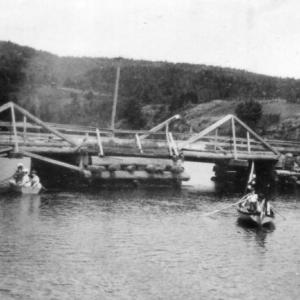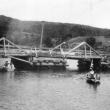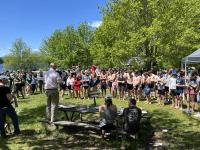This Week in Lincolnville: Walking on Layers
Fifteen years ago the Lincolnville Historical Society published Staying Put in Lincolnville, Maine: 1900-1950. My original plan was to cover the whole of the 20th century, but after nine years of interviewing dozens of people who’d grown up here, reading town reports, collecting data from the four censuses available at the time (1900, 1910, 1920, and 1930,– census data is not released until 70 years after it’s collected), and exploring bound copies of the Camden Herald, I realized that the first five decades of the 20th century were all I’d be able manage.
Besides, the kind of stories I was hearing from people, often intimate portraits of their parents and grandparents, were better told long after the fact. People in the middle of their lives weren’t likely to be comfortable sharing their current trials and tribulations, and I certainly wouldn’t be comfortable writing about them.
CALENDAR
MONDAY, Sept. 30
Schoolhouse Museum Open, 1-4 p.m., 33 Beach Road
LCS Soccer at Boothbay
TUESDAY, Oct. 1
Needlework group, 4-6 p.m., Library
WEDNESDAY, Oct. 2
Schoolhouse Museum Open, 1-4 p.m., 33 Beach Road
LCS Soccer vs Bristol, 3:45 p.m., LCS
Watercolor Journaling, 4-6 p.m., Library
Building His Own Boat, 7 p.m., Library
THURSDAY, Oct. 3
Soup Café, Noon-1p.m., Community Building
Cross Country Meet, 4:00-girls, 4:45-boys, Great Salt Bay
FRIDAY, Oct. 4
Roadside Cleanup, 9 a.m. – 3 p.m., Library
School Picture Day, 8:30 a.m. to 12:30 p.m., LCS
Family Music Together, 11 a.m., Library
Schoolhouse Museum Open, 1-4 p.m., 33 Beach Road
Movie Night, 6 p.m., LCS
SATURDAY, Oct. 5
Intro to Pickleball and Open Play, 9-11 a.m., LCS Outdoor Courts, 523 Hope Road
Roadside Cleanup, 9 a.m. – noon, Library
Pickles, Preserves, and Pies, 9 a.m. to 1 p.m., McLaughlin’s Lobster Shack
EVERY WEEK
AA meetings, Tuesdays & Fridays at 12:15 p.m., Wednesdays & Sundays at 6 p.m., United Christian Church
Lincolnville Community Library, open Tuesdays 4-7, Wednesdays, 2-7, Fridays and Saturdays, 9 a.m.-noon. For information call 706-3896.
Soup Café, every Thursday, noon—1p.m., Community Building, Sponsored by United Christian Church. Free, though donations to the Community Building are appreciated
Schoolhouse Museum open M-W-F, 1-4 p.m.
Bayshore Baptist Church, Sunday School for all ages, 9:30 a.m., Worship Service at 11 a.m., Atlantic Highway
United Christian Church, Worship Service 9:30 a.m., Children’s Church during service, 18 Searsmont Road
I fictionalized the family stories to the extent that I told them from the point of view of one of the participants. I couldn’t be sure how these people, long dead in most cases, would feel about the situations I was describing, but a careful questioning of the descendent telling their story, gave me confidence that I was probably coming close to their sentiments. I saved all the interview notes; they’re archived in the files at the Schoolhouse Museum. If I interviewed your parent or grandparent and would like to see what they told me, you’re welcome to read them.
For example, when I spoke with Erwin and Evelyn Heald about his parents, Claude and Ethel, they told me how after the couple had married he’d worked on a yacht as deckhand and cook while she worked as a seamstress. They were saving up to build a house on the Youngtown Road land she’d inherited. So to tell that story I imagined Claude sitting on deck of the Scythian, his work done for the day, somewhere on Penobscot Bay, watching the sun set behind the Camden Hills, where Ethel was living with her mother in West Rockport.
Did that ever happen? I have no idea, but could it have happened?
As Evelyn told me the story of her in-laws’ younger days, it certainly seemed feasible that Claude would spend lonely nights out on the Bay, thinking of his wife, tallying up his earnings, planning for the home they would build.
So that’s the model I used for most of the family stories: put one of the people in a situation that would be typical for a farmer or a farm wife, a schoolteacher or a doctor. And then have that character muse about his/her life, much as any of us might work over problems in our minds or recall incidents in our lives.
About a third of the book are factual essays about everything from the telephone company to the Lincolnville Socialist Party to children working to WW I’s Yankee Division, the fire department, Scott Knight’s General Store, and lots more.
The Introduction to Staying Put, written after the book was finished, is a summing up, a place where I put my feelings about this town I’ve called home for nearly 50 years.
I called it Walking on Layers:
Every place I walk in our town I’m conscious of the ones who walked here before me. Imagine layers beneath our feet, each one a different era, but peopled with individuals whose lives were every bit as filled with the STUFF OF LIFE as our own.
On picturesque Pond Bridge at the Norton Pond inlet, which is now a bland state highway culvert, lovers kissed in the moonlight. In the kitchen of a certain house near Youngtown Road a mother rocked her dying child until its breath stopped. Living rooms saw paper-flower- bedecked weddings as well as funerals, sometimes for an aged parent whose life had ended with a satisfyingly peaceful death, but just as often for a younger person—mother, beloved child or sturdy breadwinner—knocked down suddenly by accident or disease leaving their numbed relatives to carry on.
Bedrooms saw birth under every possible condition, rooms that can be stifling in summer with their low eaves and only one window to let a little breeze in. And in winter they were frigid; how did the laboring woman stand it? Babies were delivered by husbands, grandmothers, sisters, aunts or perhaps the neighbor woman everyone called the midwife. Husbands made long, desperate rides through snow or mud or rain, usually at night it seems, to get the doctor. If he didn’t get back in time his wife delivered alone. Sometimes the baby died, and too often, the mother did. But mostly both thrived.
Do you live in a brand-new house? No layers there, you say. But think again; you live on top of somebody’s hayfield, potato patch or woodlot. Think how haying season could stress already-beleaguered marriages. Thunderclouds piling up when the hay was almost dry, but still in the field, every family member working to the limit of their strength to pitch the hay onto the wagon and haul it up into the loft of the barn. The man worried about feeding his stock, caring for his family, while the woman worried about getting the next meal on the table. Woodlots saw tragedy—a hung-up tree or limb is called a widow-maker for good reason.
But sometimes a newly-married couple, before babies kept the wife home, ventured down to a camp in the woods behind Slab City, say, for the winter; she cooked for the crew which he ran, cutting wood. Maybe they worked for a wealthy summer family and stayed nearby in a seaside cottage, brief interludes before real life put an end to such intimacy.
Our gardens yield bucket after bucketful of broken crockery, metal buckles, nails, latches, hinges, even rotting leather shoes. Did a child drop the sugar bowl one morning? Did he get whipped for it? Or did the husband, angry at his inability to get a few dollars ahead, smash his wife’s favorite vase, or did she, worn out with too many kids, throw the plate at him? Or did things simply get broken, worn out and thrown away, just like ours do today?
Anywhere in town you might pick up a horseshoe, the only tangible sign of the legions of animals that made life here possible. The horse was revered then as a man loves his pick-up today, his snowmobile, his racy little car; all that’s left of them is some mildewy harness hanging in old barns and the thousands of iron shoes they wore.
How many hundreds and hundreds of docile cows grazed on our rough pastures, chewed their cud under this or that very oak and fairly trotted to the barn, udders swinging, to be milked at dusk? What about the hundreds of thousands of chickens, hens and broilers, spending their brief lives in the now-ruined henhouses crumbling around town?
But did anything important happen here? In Lincolnville’s 230 years since “settlement”, (that obscure day in 1770 when the first white settlers, Nathan and Lydia Knight, built their log cabin and stayed), has anything of historical note happened here?
Truthfully, very little. But looked at another way, every human thing did. The oldtimers, the generation before most of us, told the stories of their lives. They knew a Lincolnville both radically different and essentially the same as the one we live in today.
We no longer raise all our food, make our clothes and marry someone just down the road. The animals in our lives are pampered pets, not the means to survival. Yet we are raising children, loving (and hating) one another in turn, striving to get ahead while, at the same time, trying to do the right thing.
School
See the sidebar for this week’s sports schedule. Note that onWednesday the LCS soccer team plays Bristol at home; come out and cheer on our team and enjoy this lovely fall weather.
This week’s cross country meet is held in Damariscotta at the Great Salt Bay Farm, 110 Belvedere Road, part of the Coastal Rivers Preserve, a beautiful spot to watch a race.
Library
This is a busy week at the Library. Not only do the Needlework/Knitting, Watercolor Journaling, and Family Music Together meet, Tuesday, Wednesday, and Friday respectively (all welcome), but there’s a Wednesday evening program, as well.
Starting at 7 p.m. Wednesday, Josh Gerritsen will tell about how he built his own sliding seat Oxford Wherry rowboat from a kit even though he had no prior boatbuilding experience, and about his recent experience racing the rowboat in the Blackburn Challenge: a 20-mile open ocean race in Gloucester.
Third Annual Lincolnville Roadside Cleanup, co-sponsored by the Library and Midcoast Waste Watch, will be on Friday, October 4, from 9 to 3 and on Saturday, October 5 from 9 to noon. Bring a friend and come help pick up litter and debris along the roads in our community. Bags donated by Viking Lumber in Lincolnville, grabbers and orange vests will be provided. Volunteers should arrive at the library parking area any time after 9 a.m. to get supplies, contact info, and road assignment. Your help is appreciated!
Pickle, Preserve, and Pie Time Again
Come to the annual sale this Saturday, 9 a.m. to 1 p.m. at McLaughlin’s Lobster Shack on Ferry Road. Locally made harvest goodies -- homemade pickles, jams, salsas, and pies along with the Lincolnville Business Group’s coffee, pies, pickle ornaments, and a raffle to benefit the Lincolnville Student Scholarship Fund. A great fall morning at the Beach for a good cause. Annual scholarships are given to students enrolling in post-secondary education, technical training, or training for public service.
Picklers, preservers, and pie bakers should bring their goodies down to McLaughlin’s this Saturday before 9 a.m.
Organizer Jane Liedtke adds this: “We could use help with the wearing of the Pickle And Pumpkin costumes if you are so inclined.”
Event Date
Address
United States

























